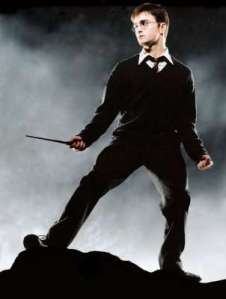
At Hogwarts, one is not only in a Benthamian-like Panopticon; he or she finds themselves rather uncomfortable, as the students are in constant surveillance. While in the Benthamian concept one always knows the source of the look (he just doesn’t acknowledge the time, when he’s being watched),at Hogwarts nobody knows exactly, not only when – but who is watching. Of course, this results a paranoiac state in which the students are deluded, thanks to the ghosts, poltegreists and dead souls from numerous paintings. The question is whether these multiplied sources of surveillance (looks) can serve as the Gaze of the Other?
In the Benthamian case, one always knows the source of the authoritarian look, even if he is not being seen, he will construct one. In the world of Hogwarts you never know who/when/why you are being watched, which is the perfect, almost ideal example of a dystopian totalitarianism, for instance.
This magical power is what makes the institution of the school a wizard school. But there is an even more problematic dimension of Harry Potter. It seems that Harry cannot enter the Symbolic Order properly, as his parents were murdered by Voldemort. There are two approaches we should consider here:
1, Harry does NOT enter the Symbolicin the classical sense , as he couldn’t have a resolution of Oedipal conflicts preoperly. The resolution of the Oedipal complex, being a passage that marks the way of the subject’s from the Imaginary to the Symbolic, clearly lacks here;but it does not mean that it is not present, and here we go: a Lacanian paradox. It is present (in the form of Harry’s father’s ghost-Hamlet? ) because Harry can revive the ghost of his father to save himself from the evil forces (or whatever)which enables him to perceive the power relations that are there to resolve somehow the Oedipal conflict.
2, On the other hand Harry’s symbolic identification was there even before his birth. The story of the legendary Potters’ lingers in Hogwarts, everybody talks about the Potters’ with excitement; thus inscribing Harry to the phase, which Lacan described as the identification with the Ideal . Ideal, not literally, is the speech which a child hears about himself and thus incorporates, creating an unconscious kernel of insignia, a nucleus of his ego-Ideal. He identifies himself through this speech. This insignia of the Other is what constitutes Harry Potter, as the greatest wizard of all-time, blah-blah.., possibly overwriting his Ideal-ego. (what he thinks about himself in the beginning: a lousy kid, always being bullied, etc.)
to be continued….







December 27, 2008 at 6:38 pm
I’d say you’re a lot like Freud. Except instead of tracing everything back to sexuality, you explain everything via lacanian definitions … and – history repeats itself – that’s when your students/followers/friends/peers start doubting 😮
😉
January 4, 2009 at 11:59 pm
zsuzsi: about what? i am trying to apply certain Lacanian notions to some themes I am interested in and ther’s no doubt about it:)
December 29, 2008 at 10:02 am
“Harry does NOT enter the Symbolic in the classical sense , as he couldn’t have a resolution of Oedipal conflicts preoperly.”
On the contrary, I think it is quite a classical case of Oedipal resolution: think of the father figures (Dumbledore and Sirius, and to a certain extent, Voldemort) or the substitute families that channel this route. His journey is constantly marked by his inner struggle with and for the Father – precisely a superegoic construction. Besides, Hogwarts IS par excellence the Symbolic order… I don’t see any paradox here, let alone Lacanian.
January 5, 2009 at 12:03 am
oky, so i’ve interpreted it from the other side…my first thought was that, according to Lacan, a some sort of a resolution of the Oedipal conflicts needs to be done to enter the Symbolic and Harry doesn’t have a clasical Father. and again that makes me think: what we call Daddy is not the same as the Name of the Father?there’s no need of a biological father to solve Oedipal conflicts?
January 15, 2009 at 11:56 am
Btw, what should this all mean? I enjoyed Harry Potter, and that’s all to it. I’m really afraid we’re not far from interpreting the magic wand as a phallus which even women can use… Just like my grandmom might be interpreted as the subordinate female subject penetrated by the superior male medical powers- in the form of her daily insuline dose. (Don’t forget the needle-phallus!)
May 18, 2009 at 3:13 pm
While sometimes a wand is just a wand, I do think it’s enlightening to see it in phallic terms. Harry Potter and the Prisoner of Azkaban is my favorite of the film adaptations, and it works really well as a piece of filmic entertainment, but the opening, where Harry is hard at work under a blanket, surreptitiously trying really really hard to make some magic, doesn’t hurt from being (mis-)interpreted as innuendo.
January 17, 2009 at 9:53 am
This is true: “I enjoyed Harry Potter, and that’s all to it” So did I!
And what does that mean? well, I’m just trying to develop alternative (not necessarily correct,no!)way of interpreting some of the cultural manifestos that I like! And because of this enthusiasm: this blog was created.
(why male medical power? if i’m correct, phallus doesn’t have to do with shape, as it is a function.)
Otherwise, you’re right: your Grandmother shouldn’t be interpreted in that way:)